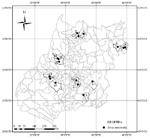ABSTRACT
The pequi tree is a native species from the Brazilian Cerrado (Neotropical Savanna) with economic and cultural importance for local human population, needing however, techniques that make possible the implantation of orchards, its conduction and the harvest of fruits, as a tool for reducing the pressure on the natural environment, as well as the maintenance of the regional culture. The present study aimed to characterize the production of pequi trees of natural occurrence in fifteen dispersed populations in five regions of the state of Goiás, Brazil. The “Pequizeiro” differed significantly in three years of production in the State of Goiás, with an average of 132 fruits per plant and yield of the projected area of the canopy of 1.64 fruits m-2. The three most productive populations have characteristics in common as the vigor by being located in an open environment and by presenting the beginning of the canopy closer to the ground. It is concluded that the production of “pequizeiro” in the state of the Goiás, shows great variability among crops, plants and populations, usually low, but there are promising plants for future breeding programs.
Caryocar brasiliense; Savanna; native fruit; “pequi”; genetic resources

 Thumbnail
Thumbnail
 Thumbnail
Thumbnail






